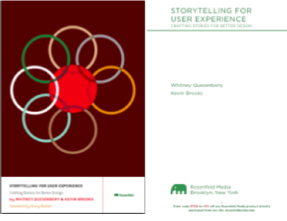I’ve referenced Storytelling for User Experience by Whitney Quesenbery and Kevin Brooks several times — and now the book is finally here.
The publishers were kind enough to send me an ebook copy of it. I’m looking forwarding to reading but am not sure how valuable a review by me would be since I know little about User Experience design.
For now, I’m presenting the table of contents. Each chapter also has a summary and suggestions for further reading:
Chapter 1
Why Stories?
What is a story?
There are many types of stories in UX design
More work? not really!
Chapter 2
How UX Stories Work
Stories are more than just narrative
Stories have many roles in user experience design
Maybe you’re not convinced
Chapter 3
Stories Start with Listening (and Observing)
UX design requires good listening skills
Listening and observing leads to better understanding
Being listened to is addictive
Learn to be a good listener
Teach your team to listen
Chapter 4
The Ethics of Stories
Good research ethics — good storytelling
Professional societies give us relevant ethics for stories
Acknowledge your own influence
Tell the story accurately
Keep the story authentic
End the story well
Chapter 5
Stories as Part of a UX Process
UX is a cross-disciplinary practice
Using stories in user experience design is not a new idea
Stories can be part of many UX activities
Chapter 6
Collecting Stories (as Part of Research)
The best stories come from being there
Other sources of stories are all around you
Listen for stories
Get groups to tell stories to each other
Explore memorable incidents
You can observe stories, too
Tips for collecting stories
Write stories into your notes
Chapter 7
Selecting Stories (as Part of Analysis)
your first audience: yourself
What are you looking for?
Finding the stories
Finding stories in data
Building stories into personas
Chapter 8
Using Stories for Design Ideas
Stories evolve through the design process
Brainstorming for new stories: generative stories
Brainstorming helper: the storytelling game
Developing user research stories: generative stories (again)
Incorporating your user research into the brainstorming game
Moving from brainstorming to concept: expressive stories
Stories that document design: prescriptive stories
Stories can be part of the brand story
Chapter 9
Evaluating with Stories
Using stories to create usability tasks
Turn user stories into “instant” usability tasks
Turning tasks into stories
Collecting stories just in time for usability testing
Using stories for reviews
Collecting stories during a usability test
Chapter 10
Sharing Stories
(Managing Up and Across)
Don’t worry — everyone is a storyteller
Help the audience build the story you tell
If you don’t know your audience well, try listening
A few audiences you may meet
Chapter 11
Crafting a Story
What do we mean by “craft”?
Stories get better with practice
Sometimes stories fail
Think carefully about your goals
Chapter 12
Considering the Audience
The relationship between the audience and the story
Details from user research help ground stories
What if they think they know, but they don’t?
Mirror stories are stories about ourselves
The relationship between you and the audience
How much are you like the audience?
Is your relationship to the story the same as the audience’s?
Do you bring different pieces of the puzzle?
Help them get from here to there
Use stories to advocate
Bring them home safely
Chapter 13
Combining the Ingredients of a Story
Perspective
Characters
Context
Imagery
Language of the story
Putting the ingredients together
Chapter 14
Developing Structure and Plot
Story structures are patterns
Story structure helps the audience, the author, and the story
Useful story structures for UX stories
Using plot
Choosing a story structure and plot
Stories are more than the sum of their parts
Chapter 15
Ways to Tell Stories
Telling oral stories
Written stories
Visual stories
Multimedia, video, or animated stories
Putting stories in your reports
Make presentations a story of their own
Choosing the medium for your story
Chapter 16
Try something new
